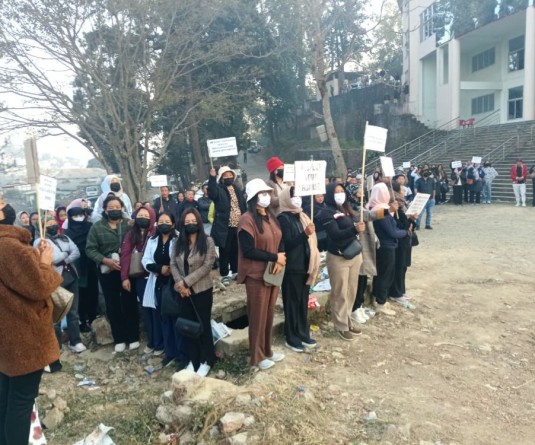.jpg)
DIMAPUR, JULY 28 (MExN): The Department of Political Science at St. Joseph University, in collaboration with the Research and Information System for Developing Societies (RIS, Delhi) and the Northeastern Training Research and Advocacy Foundation (NETRA), hosted a one-day national symposium on "India’s Role in Shaping Indo-Pacific Regional Order."
The event attracted undergraduate and postgraduate students from various institutions, including St. John College, C-Edge College, Patkai Christian College (Autonomous), Tetso College, ICFAI University, Nagaland. Forward Nagaland NEWS (FNN) served as the media partner for the symposium.
The symposium, held on July 26, aimed to explore India's influence, contributions, and challenges in the evolving Indo-Pacific regional order, addressing various aspects such as economic, political, connectivity, and societal dimensions in the region.
Dr. Nabarun Roy from the Department of International Relations at South Asian University, New Delhi, delivered the keynote address. He discussed the constructed notion of the Indo-Pacific in contemporary international politics, tracing India's strategic approach from the 1950s and its views on alliances and defense pacts such as SEATO, Designate Areas, Colombo Powers, and the Asia-Africa Growth Corridor. Dr. Roy highlighted India's bilateral relations with Southeast Asian countries and examined whether India is balancing against China or engaging in "evasive balancing" strategic diplomacy.
Dr. Temjenmeren, Associate Fellow at IDSA, New Delhi, spoke on "India and Southeast Asia Building Consensus in the Indo-Pacific." Dr. Salikyu, Associate Professor at Tetso College, presented on "India: Vacillating Between History and Ambition." Benjungnungsang, Assistant Professor at St. Joseph University, discussed "The Significance of the Indian Ocean in the Indo-Pacific Region."
The valedictory address was delivered by Dr. Joyce Sabina Lobo from St. Aloysius (Deemed to be University), Bangalore. Dr. Lobo examined the dynamics and roles of various countries in the Indo-Pacific region through realist and liberal perspectives.
The symposium concluded with closing remarks by Dr. Somingam Mawon, Associate Professor at St. Joseph University, followed by a vote of thanks from Dr. Moameren Pongen, Assistant Professor at St. Joseph University.






